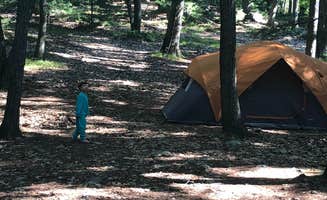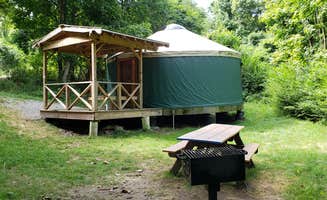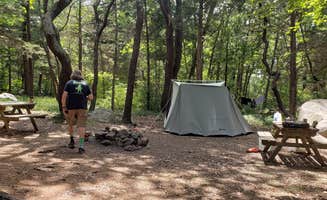Tent camping areas near Nahant, Massachusetts range from coastal island sites to wooded mainland options within 25 miles of this North Shore peninsula. The camping season typically runs from May through mid-October, with Boston Harbor Islands sites operating June through Labor Day weekend. Many locations require advance reservations, particularly during summer weekends when availability becomes limited. Winter camping is generally unavailable throughout the region, with most facilities closing during colder months.
What to do
Explore island fortifications: Boston Harbor Islands State Park Campground offers access to historical military structures. "Exploring the island was awesome. We found all kinds of bunkers and a brick house," notes reviewer Jess G., who camped at Lovells Island.
Gather seasonal fruit: Seasonal berry picking provides a natural harvest opportunity on some islands. One camper mentioned: "In mid-August we collected handfuls of blackberries as we explored Peddocks," creating an unexpected foraging experience during their island stay.
Visit nearby coastal towns: Cape Ann Camp Site serves as a convenient base for exploring New England seaside communities. A reviewer observed, "Cape Anne is beautiful. Perfect location with access to Rockport - a beautiful place to visit, shop, eat & a great little trail with great views."
Beach activities: Multiple camping locations offer beach access for swimming and shoreline recreation. "Beach down the street was big, beautiful and low tide was unexpected as you could walk for ever," reports one Cape Ann camper about nearby coastal areas.
What campers like
Island isolation: The relative seclusion of harbor island camping creates a unique experience despite proximity to Boston. One visitor mentioned, "Camping at Boston Harbor Islands requires some planning, but you get the benefit of a remote island with minimal company."
Evening campfires: Building fires along beaches creates memorable nighttime experiences at certain sites. A camper reported, "We ended up making a fire pit on the beach and a flat rock 'grill' to make our burgers," demonstrating resourceful outdoor cooking solutions.
Wildlife viewing: Natural settings support opportunities to observe local wildlife species. According to a review from Camp Nihan Education Center, the grounds provide access to "Breakheart Reservation, which had a great shallow pond with life guard on duty as well as bike trails and a range of different hikes."
Wooded privacy: Tree cover between sites enhances camping experience at mainland locations. One Cape Ann visitor noted: "We had a nice perfectly level site in a beautiful wooded area," highlighting the natural screening between camping spots.
What you should know
Ferry logistics: Water transport to island campsites requires careful schedule planning. A camper advised: "Figuring out the schedule is the trickiest part, not least because they don't make the inter-island ferry schedule as readily accessible," suggesting thorough transportation research before island camping trips.
Bring adequate water: Limited drinking water access affects preparation requirements. "Make sure that you bring enough drinking water and that you are ok with using the composting bathroom or going in the woods," warns a harbor island camper, emphasizing the rustic nature of island facilities.
Shower facilities: Mainland campgrounds typically offer bathing facilities, often coin-operated. One Cape Ann visitor mentioned: "25 cents per 5 minute hot shower is offered in the public restroom," detailing the specific pay structure for this basic amenity.
Seasonal availability: Most camping options operate within limited months. "It's back open and lovely," reports a recent Boston Harbor Islands camper, referencing the seasonal nature of the facilities that close during colder months.
Tips for camping with families
Child-friendly terrain: Camp Nihan Education Center offers accessible camping for younger children. A family group leader shared: "The group site is super close to parking and yet the terrain is rugged enough that it always felt like we were really in the woods," describing the balance between convenience and authentic outdoor experience.
Junior Ranger programs: Educational activities engage children during island camping trips. One parent recommends families can "earn a Junior Ranger badge from the National Park Service, fly a kite, or go for a swim or kayak" while exploring the harbor islands.
Pack light for island transfers: Multiple transportation stages complicate gear management for island camping. A family advises: "Pack as lightly as possible and plan to carry or wheel it to your site. If you have a folding wagon, you may appreciate having it to carry items on and off the ferry and to your site on the island."
Consider yurt options: Structural shelter alternatives provide comfort for families. "The yurts have bunk beds, a floor lamp, a table inside, a picnic table outside and a grill," explains a Peddocks Island visitor, noting these accommodations book quickly but provide enhanced comfort for family groups.
Tips from RVers
Site selection: RV spaces vary in privacy compared to tent areas. A camper observed: "The RV sites are not as secluded as the tent sites," highlighting differences in site characteristics between accommodation types at Cape Ann.
Hookup availability: Cape Ann provides multiple service connections for recreational vehicles. According to one RVer: "They have water, sewer, and electric hookups. No wifi," detailing the available utilities while noting connectivity limitations.
Size accommodations: The campground can handle various RV dimensions. A reviewer stated: "All size RVs and tents are welcome," confirming that Cape Ann Camp Site accommodates diverse camping setups despite its wooded setting.




